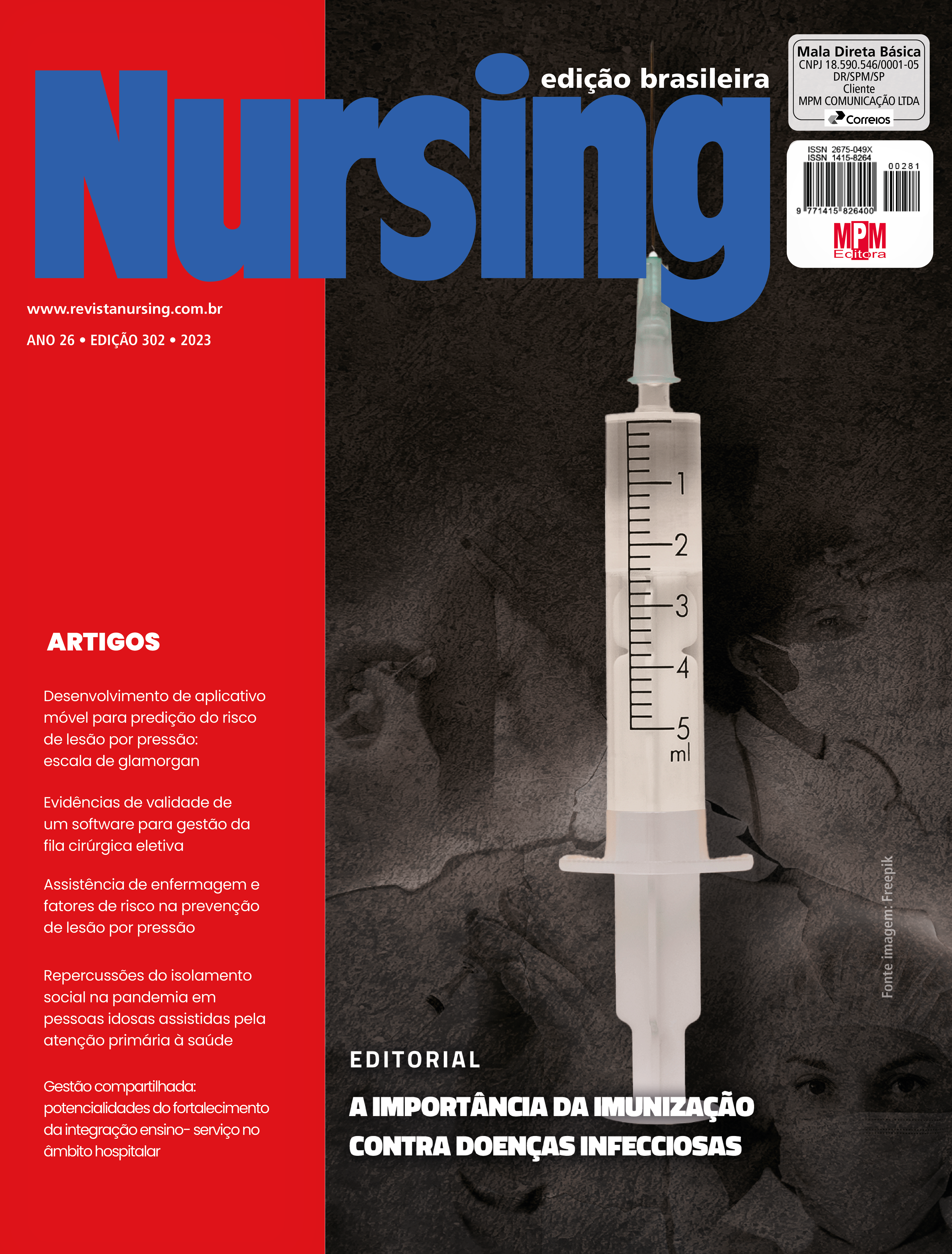DESENVOLVIMENTO DE APLICATIVO MÓVEL PARA PREDIÇÃO DO RISCO DE LESÃO POR PRESSÃO: ESCALA DE GLAMORGAN
DOI:
https://doi.org/10.36489/nursing.2023v26i302p9766-9770Palavras-chave:
Lesão por Pressão, Tecnologia em Saúde, mSaúde, Aplicativos Móveis, EstomaterapiaResumo
Objetivo: Desenvolver um aplicativo móvel que utilize a Escala de Glamorgan para prever o risco de lesões por pressão em pacientes pediátricos, no cuidado à beira do leito. Método: Trata-se de um estudo metodológico para o desenvolvimento de um aplicativo móvel visando a predição do risco de lesão por pressão pela Escala de Glamorgan, com base no referencial metodológico de Cook & Dupras. Resultados: Seguindo as etapas estabelecidas pelo referencial metodológico, concluímos o desenvolvimento do aplicativo móvel em saúde intitulado "LPP - Escala de Glamorgan". O aplicativo é composto por cinco abas que fornecem informações relevantes sobre a avaliação e prevenção de lesões por pressão. Conclusão: O aplicativo foi desenvolvido conforme as etapas estabelecidas no referencial metodológico, abrangendo os principais conceitos e informações relacionadas à Lesão por Pressão e sua prevenção em pacientes pediátricos. Além disso, foi incluída uma aba específica para facilitar a aplicação rápida e intuitiva da Escala de Glamorgan por enfermeiros durante o atendimento à beira do leito.
Referências
Figueiredo F, Conceição T, Bündchen D. PRÁTICA CLÍNICA E BARREIRAS RELACIONADAS À MOBILIZAÇÃO PRECOCE EM UNIDADE DE TERAPIA INTENSIVA. Arquivos de Ciências da Saúde da UNIPAR. 2022;26.
Cummins KA, Watters R, Leming-Lee TS. Reducing Pressure Injuries in the Pediatric Intensive Care Unit. Nursing Clinics of North America. 2019;54(1):127-40.
Vocci MC, Fontes CMB, Abbade LPF. Pressure Injury in the Pediatric Population: Cohort Study Using the Braden Q Scale. Adv Skin Wound Care. 2018;31(10):456-61.
Matozinhos FP, Velasquez-Melendez G, Tiensoli SD, Moreira AD, Gomes FSL. Factors associated with the incidence of pressure ulcer during hospital stay. Rev Esc Enferm USP. 2017;51:e03223.
Vocci M, Onary A, Castro M, Spadotto A, Fontes C. Análise retrospectiva da aplicação da escala de Braden Q em terapia intensiva pediátrica. ESTIMA, Brazilian Journal of Enterostomal Therapy. 2020;11.
Rodrigues CBO, Prado TND, Nascimento LCN, Laignier MR, Canicali Primo C, Bringuente MEO. Management tools in nursing care for children with pressure injury. Rev Bras Enferm. 2020;73 Suppl 4:e20180999.
Delmore B, VanGilder C, Koloms K, Ayello EA. Pressure Injuries in the Pediatric Population: Analysis of the 2008-2018 International Pressure Ulcer Prevalence Survey Data. Adv Skin Wound Care. 2020;33(6):301-6.
Ferreira MKM, Gurgel SS, Lima FET, Cardoso M, Silva VMD. Instruments for the care of pressure injury in pediatrics and hebiatrics: an integrative review of the literature. Rev Lat Am Enfermagem. 2018;26:e3034.
Vocci MC, Fontes CMB, Abbade LPF. Cultural adaptation of the Glamorgan Scale to Brazilian Portuguese: Pressure Injury in Pediatrics. Rev Lat Am Enfermagem. 2021;29:e3424.
Curley MAQ, Hasbani NR, Quigley SM, Stellar JJ, Pasek TA, Shelley SS, et al. Predicting Pressure Injury Risk in Pediatric Patients: The Braden QD Scale. J Pediatr. 2018;192:189-95 e2.
Triantafyllou C, Chorianopoulou E, Kourkouni E, Zaoutis TE, Kourlaba G. Prevalence, incidence, length of stay and cost of healthcare-acquired pressure ulcers in pediatric populations: A systematic review and meta-analysis. Int J Nurs Stud. 2021;115:103843.
Willock J, Baharestani MM, Anthony D. The development of the Glamorgan paediatric pressure ulcer risk assessment scale. J Wound Care. 2009;18(1):17-21.
Vocci MC, Amante Miot H, Mendes Bertoncello Fontes C, Fernandes Abbade LP. Pressure Injury Risk Assessment in Pediatric Intensive Care: A Prospective Validation Study of the Glamorgan Scale and Predictive Comparison with the Braden Q Scale. Adv Skin Wound Care. 2023;36(3):1-7.
eHealth WHOGOf. mHealth: new horizons for health through mobile technologies: second global survey on eHealth. Geneva: World Health Organization; 2011.
Pires IM, Marques G, Garcia NM, Florez-Revuelta F, Ponciano V, Oniani S. A Research on the Classification and Applicability of the Mobile Health Applications. J Pers Med. 2020;10(1).
Vaghefi I, Tulu B. The Continued Use of Mobile Health Apps: Insights From a Longitudinal Study. JMIR Mhealth Uhealth. 2019;7(8):e12983.
Cook DA, Dupras DM. A practical guide to developing effective web-based learning. J Gen Intern Med. 2004;19(6):698-707.
Siqueira Campos R, Blanes L, Nicodemo D, Masako Ferreira L. “Sem Pressão”: application with guidelines for identification, staging and prevention of pressure injuries. Estima – Brazilian Journal of Enterostomal Therapy. 2020;18.
Airth-Kindree N, Vandenbark RT. Mobile applications in nursing education and practice. Nurse Educ. 2014;39(4):166-9.
Lima CSP, Barbosa SdFF. Aplicativos móveis em saúde: caracterização da produção científica da enfermagem brasileira. Revista Eletrônica de Enfermagem. 2019;21:53278.
Baca K, Rico M, Stoner M. Embracing technology to strengthen care and enhance human connection. Dimens Crit Care Nurs. 2015;34(3):179-80.
Silva AMA, Mascarenhas VHA, Araújo SNM, Machado RDS, Santos A, Andrade E. Mobile technologies in the Nursing area. Rev Bras Enferm. 2018;71(5):2570-8.
Zanetti AAPM, Arruda CF, Ferreira ASSBS, Vocci MC, Fontes CMB. Desenvolvimento de aplicativos móveis para educação em saúde no acidente vascular cerebral. Nursing (Ed bras, Impr). 2022;25(291):8266-75.
Scafide KN, Narayan MC, Arundel L. Bedside Technologies to Enhance the Early Detection of Pressure Injuries: A Systematic Review. J Wound Ostomy Continence Nurs. 2020;47(2):128-36.
Sprigle S, McNair D, Sonenblum S. Pressure Ulcer Risk Factors in Persons with Mobility-Related Disabilities. Adv Skin Wound Care. 2020;33(3):146-54.








